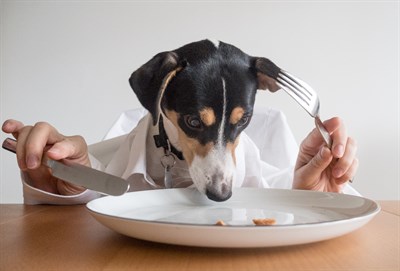Protect Your Pets from Food Hazards During the Holidays

Sweet treats and family meals are a hallmark of the holidays, but for many of our furry friends, these same indulgences can be dangerous. Dr. Mark Stickney, Director of General Surgery Services at the Texas A&M University College of Veterinary Medicine & Biomedical Sciences, tells us how we can keep our pets safe from toxic foods while enjoying the holiday season.
One of the major food dangers to our pets during the holidays and beyond is chocolate. Eating chocolate, especially dark chocolate, can cause toxicity in dogs and cats, which can result in death.
“While chocolate is toxic to both dogs and cats we see chocolate toxicity much more often in dogs. This is simply because dogs are much more likely to eat it. However, it is important to keep it away from all pets just in case,” notes Stickney. Although chocolate has long been a known toxin for dogs, other foods and vegetation can also be very harmful.
“Few people know this, but both grapes and raisins can cause renal failure in dogs,” states Stickney. “Another thing to note is that Easter lilies, or really any flower from the lily family, can cause kidney failure in cats.”
While these foods are especially dangerous, feeding any table scraps to your pets can cause them harm in the long-run. Because of this, Stickney stresses the importance of keeping your pet’s diet regular year-round.
“During the holidays it is common for friends and family members to slip your pets food under the table. While they think they are giving them a nice treat, the high fat content of most table scraps can not only cause weight control problems, but can also cause pancreatitis,” says Stickney.
In order to avoid these situations, Stickney suggests that you ask any guests to avoid the temptation of feeding your dogs table scraps and explain to them the risks associated.
“Most people are more than willing to respect your wishes, especially when they know the health concerns,” Stickney notes. “Of course children are another story. The only thing you can do is watch them like a hawk.”
Even if they are not given food, pets can sometimes find it themselves. It is not uncommon in the commotion and food preparation of the holidays to find your animal knee-deep in your trash can.
“It’s important to remember to always keep you trash closed with a lid or put somewhere your animal cannot reach it,” states Stickney. “If they do get into it you may have a sick animal on your hands and no way of knowing what and how much they ate.”
While it is best to keep your animals on their regular diet, Stickney does say that there are some foods that are safe for pets to eat.
“If you absolutely have to give them something off of your plate, hand them a green bean,” says Stickney. “Plain vegetables and unbuttered, unsalted popcorn are both pretty harmless since they are mostly fiber and don’t contain a lot of extra calories.”
Although toxic food is a major concern for your pets during the holiday season, other common substances and smells can also harm them during this time.
“Birds are very sensitive to anything they can inhale. During the holidays people like to burn smelly candles and our guests may want to smoke, but these types of irritants can give our winged companions the bird version of a cold,” states Stickney.
Another thing to keep in mind, as the weather gets colder and you start changing your anti-freeze to keep your dogs away from it.
“Anti-freeze has a sweet taste to it that dogs seem to like. Unfortunately it is extremely toxic and can cause renal failure,” notes Stickney.
The important thing to remember is that your pets are part of your family. By keeping an eye out for toxic foods and avoiding over-feeding pets, you can make sure the entire family is enjoying the season.
Pet Talk is a service of the College of Veterinary Medicine & Biomedical Sciences, Texas A&M University. Stories can be viewed on the Web at vetmed.tamu.edu/news/pet-talk. Suggestions for future topics may be directed to editor@cvm.tamu.edu.
Angela G. Clendenin
Director, Communications & Public Relations
Ofc – (979) 862-2675
Cell – (979) 739-5718


